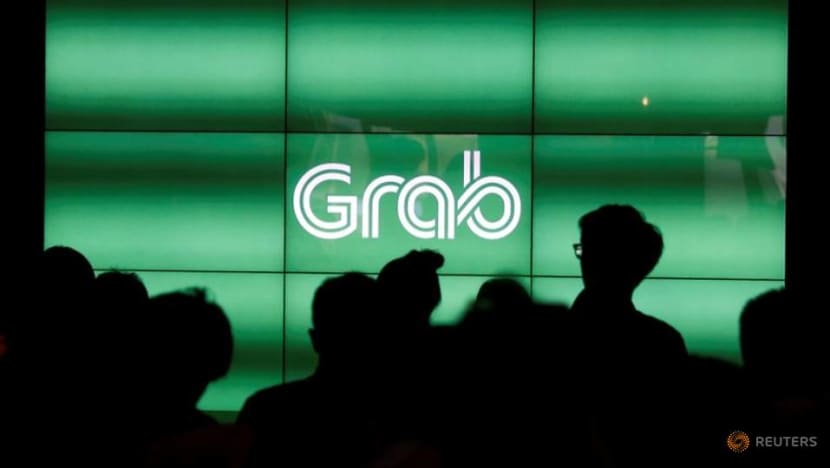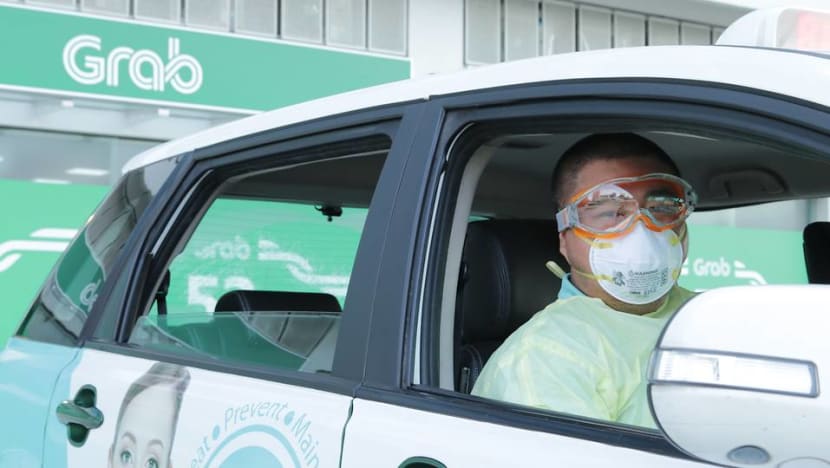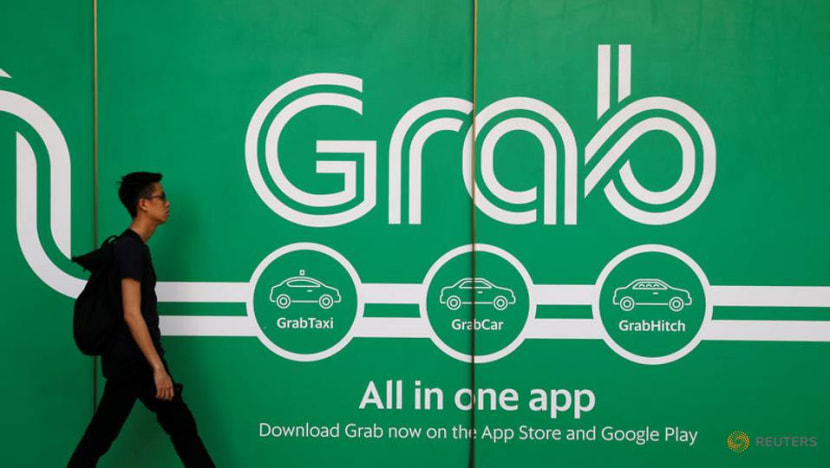commentary Commentary
Commentary: Is trouble brewing in Grab paradise?
Grab’s announced layoff of about 360 staff members suggests a rougher ride ahead, but people are hoping the company will weather the COVID-19 storm, says Jonathan Chang.

Motorbike taxi drivers prepare to strap on backpack-style plastic partitions to prevent the spread of COVID-19 as they wait for customers in Jakarta, Indonesia, Jun 9, 2020. (Photo: REUTERS/Willy Kurniawan)
SINGAPORE: For all the stewing fears of coronavirus dismissals since the pandemic caught economies by surprise, this week may have seen the unemployment monster finally begin to rear its ugly head in Singapore.
Amid the worst jobs numbers in a decade and an economist consensus of a projected second quarter contraction of 11.8 per cent, it was the announcement that super app titan Grab would be laying off about 5 per cent of staff that really caught people by surprise.
Southeast Asia's most valuable unicorn backed by SoftBank and last valued at US$14 billion, Grab announced the layoffs at a townhall led by CEO and founder Anthony Tan on Tuesday (Jun 16).
Around 360 people will be affected across Southeast Asia. While Mr Tan assured staff that “this will be the last organisation-wide lay-off this year”, it is unclear whether the firm’s announced restructuring to eliminate non-core projects and consolidate functions will lead to more cuts in specific business units down the road.
BREWING CONCERNS
The writing was on the wall when co-founder Tan Hooi Ling warned last month of a “long winter”. Grab also announced a limit to its performance-based commission rebate to 18,000 drivers and had even asked employees to go on voluntary no-pay leave.
It was also barely a week ago that Grab Singapore head Yee Wee Tang told CNA the growth in food deliveries was insufficient to cover the sharp decline in its ride-hailing business, after coming under fire for high commission fees charged to eateries.
READ: Commentary: Getting your food order delivered should be straightforward so why isn’t it?
Listen: How many stars will you give Singapore's F&B industry this COVID-19 season?
To be fair, Grab’s latest round of retrenchments have been rather muted, when you compare their 5 per cent layoff rate to Uber’s letting go of 14 per cent of its global workforce last month and Deliveroo’s 25 per cent cut to its Singapore staff.
If anything, this latest announcement provides insight into the overall health of the private car-sharing sector and its adjacent verticals including food delivery, suggesting this sector is on shaky ground.

READ: Commentary: Were you fired or retrenched? Your employer may not tell you the difference
Prolonged lockdowns around the world and people’s subsequent hesitation of being out and about even after restrictions are lifted, combined with the likely continuation of work-from-home arrangements for the foreseeable future have delivered a double whammy to this class of platform titans and strained their balance sheets.
The disrupters have been disrupted by the ultimate agent of havoc: The coronavirus.
GRAB HAS CHANGED OUR LIVES - MOSTLY FOR THE BETTER
When news of the layoffs broke yesterday, many were concerned loved ones working in the ride-hailing giant might have been impacted and their livelihoods endangered.
But the news astonished more, because Grab has come to be an intractable part of Singapore’s social and economic fabric, changing the way we pay, roam and eat.
Laying aside controversy over the high commission fees, few eateries can imagine making the wholesale migration to e-commerce and food deliveries, much less reaching this broad a customer base.
READ: Commentary: Our coronavirus diets and what’s behind the urge to eat like kids
READ: Commentary: We are becoming a 'dabao nation' – why does it feel like a bad thing?
Grab might have been an expensive platform and marketing firm to get on, but in the time of COVID-19, F&B microenterprises might prefer at least having this option.
The private car-sharing app has also reshaped the taxi industry for the better. Long gone are the days where it took forever and a minute more to find a cab.
For cab drivers, having to drive around looking for passengers to no avail must seem like a distant dream (at least before the coronavirus struck).
For better or worse, Grab has inextricably fused itself into the daily lives of Singapore residents. They say a brand has made it when people start using it as a “verb” in their daily lexicon and don’t we know it.
In this dog-eat-dog world of commerce, Grab has risen above its competitors in Southeast Asia. Uber threw in the towel after years of a bloodbath for a controlling market share in Southeast Asia.

Even Go-Jek’s growth has primarily been concentrated in Indonesia, the largest addressable market size in Southeast Asia.
CAPITALISM SHAKEN TO ITS CORE
While Grab has stoked debate and raised eyebrows in the course of its unruly journey these past years, few, if any, would want to see Grab continue losing revenues and laying off people.
In the good old days, we consumers enjoyed the perks of deep discounts on rides and food deliveries. If we were offered a S$5 off coupon, we would snap it up.
Even when we knew deep down within this business model that doled out ridiculously priced bargains was in no way sustainable, we applauded Grab for being an innovative, revolutionary firm that transformed the transport landscape and more.
When the Singapore Government provided the legislative space recognising Grab’s value, with a new point-to-point transport bill implicitly acknowledging the criticality of this new business model in 2019, it surely did so after a hard-nosed calculation that Grab was on the whole beneficial for the Singapore economy and was contributing to economic growth.
The firm was providing jobs in a burgeoning digital technology sector, including aiding people to get back on their feet with gigs as drivers or deliverers when their going got tough.
READ: Commentary: The future economy has arrived. It’s mostly digital and contact-free
READ: Commentary: Multibillion-dollar wizards – how COVID-19 is exposing what’s behind the curtain
But now when the cards are down, we worry that these layoffs augur a rougher ride ahead. Perhaps we have been in as much denial as Softbank. We wanted to believe companies like Grab would grow so big, they would eventually turn profitable on their own.
One thing is for certain: COVID-19 has shaken capitalism to its core.
In the business world, there is growing talk of the “Economics of Mutuality”, championed by Mars Incorporated Chief Economist Bruno Roche, which urges businesses to consider a model that “offers maximum freedom to realise optimal, sustainable, long-term success for business, people, the communities they operate in and our planet”.
Firms are encouraged to focus on delivering value to people, considering the interests of stakeholders across the value chain and long-term sustainability.

“The signs from these past months are encouraging and show that businesses have begun to rethink risks and reimagine their role and purpose in society,” National Volunteer and Philanthropy Centre chief Melissa Kwee said in a CNA commentary.
Mr Tan’s address to Grabbers on Tuesday suggest he knows this too. “Our commitment to our customers in Southeast Asia is unwavering. We are deeply rooted here and we continue to stay true to our mission of driving Southeast Asia forward,” he said.
Grab may not be out of the woods yet. But the hope is that Grab can turn things around, especially if demand in ride-hailing picks up as Singapore shifts into Phase 2 of its reopening come Friday.
LISTEN: TraceTogether token and contact tracing apps: Privacy, data usage and other big questions
BOOKMARK THIS: Our comprehensive coverage of the coronavirus outbreak and its developments
Download our app or subscribe to our Telegram channel for the latest updates on the coronavirus outbreak: https://cna.asia/telegram
Jonathan Chang is an entrepreneur, investor, educator, and global speaker.















